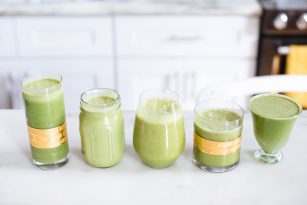Take one look at the lemon nutrition profile and it’s easy to tell why this super sour fruit is so great for your health.
It’s packed with vitamin C, plus fiber and an array of important antioxidants. Plus, this tasty fruit is refreshing, light, sometimes sweet, mostly sour, and always pleasant in my book. It’s also versatile and easy to use in nearly any recipe, whether it’s a main course, side dish, sauce, or salad dressing.
Lemons are one of several fruits we typically don’t consume whole or eat as is. Instead, lemons are normally used as a flavor catalyst or to bring an acidic profile to a dish. The sweet lemon varieties, such as Meyer lemons, do not contain as much citric acid, which is responsible for giving lemons their distinct sour and tart taste.
Some of the most common culinary uses for lemons are in salad dressings, added to water, desserts, savory dishes, squeezed on an avocado, or added to homemade hummus, dips, salsas, fish, chicken, or whatever your tart heart desires.
Benefits of Lemon Nutrition
1. Great source of vitamin C
The lemon nutrition profile is loaded with vitamin C. Why is this important? For starters, it’s one of the most widely and important available antioxidants.
Vitamin C is a water-soluble vitamin/antioxidant found in many fruits and vegetables, including lemons. Because vitamin C is water-soluble, it travels nicely through our bodies in both the aqueous (water-like) environments inside and outside our cells, neutralizing harmful free radicals along the way. Free radicals damage our healthy cells and cause oxidative stress, which ultimately can cause harm to our hormones, blood vessels, proteins, lipids, and genetic code; contributing to cancer, inflammation, pain, degenerative diseases, heart disease, and even aging.
2. Supports digestive health
Looking to give your digestive system a boost? Try adding fresh lemon juice to warm water with a dash of cayenne pepper for the ultimate digestion and detoxification drink.
The warm water and high vitamin C content both aids the digestive tract and increases peristalsis (also known as the movement of the digestive tract). The natural antioxidants, including vitamin C, also calm liver inflammation while the cayenne pepper contains capsaicin, a compound that increases blood flow and stimulates liver enzymes involved in detoxification.
3. Promotes skin health
Thanks to the anti-inflammatory properties found in lemon, it’s often used as a natural treatment for a number of skin conditions. According to some research, supplementing with antioxidants (or antioxidant-rich foods, like lemons), could even help slow the aging process by blocking the build-up of harmful free radicals in the skin (1).
As an all-natural treatment for eczema, try mixing 8-10 drops of essential lemon oil with one tablespoon of raw honey and one cup of lukewarm water. Next, soak a linen cloth into the liquid lemon mixture and wrap the areas of your skin affected by eczema. Leave on for 15-20 minutes a couple times a day, which will help soothe both the inflammation and the urge to itch.
Meanwhile, for acne, add about one tablespoon of fresh lemon juice to a cotton ball and gently rub all over the face for a natural astringent. You can leave this on overnight and wash in the morning, or wait about ten minutes before rinsing it off with a gentle cleanser.
4. Acts as a natural household cleaner
The benefits of lemon nutrition extend way beyond the kitchen. In fact, you can even use lemons as a natural household cleaner to help remove unpleasant odors, brighten up stains, and freshen things up around the house.
Try adding a leftover or used lemon peel (about half of a lemon) to the kitchen garbage disposal to reduce the smell. You can also add half of a fresh lemon to two cups of water and boil in the microwave to give it a natural steam clean with a fresh lemon scent. On cutting boards, you can also scrub and wipe a freshly-cut lemon to freshen the scent and remove any stains. The acidity of lemon juice also works well on other stains as well, as long as you do a spot test prior to applying due to its bleaching effects.
5. Protects against cold symptoms
When cold season strikes, citrus fruits and vitamin C tablets are among the most common natural remedies. Brimming with vitamin C, lemons are an excellent dietary addition to give the immune system a boost and kick cold symptoms to the curb. According to one study out of Switzerland, getting enough vitamin C each day was shown to reduce symptoms and shorten the duration of respiratory tract infections, including the common cold (2).
Next time you start feeling under the weather, try adding the juice of a fresh lemon to one tablespoon of honey with hot water. Drink throughout the day to help stimulate digestion, up your intake of vitamin C, and take advantage of the natural antimicrobial properties that lemon nutrition can provide. Or, try gargling one tablespoon of fresh lemon juice with a teaspoon of sea salt mixed into one cup of lukewarm water. Gargle at least twice a day for one to two minutes at a time to soothe sore throats fast.
6. Repels bugs and relieves bug bites
Swap out the chemical-laden bug sprays for a natural, lemon-based bug repellant instead. It’s effective, easy to prepare, and budget-friendly, making it a great alternative to store-bought products. Mix about 20 drops of lemon essential oil into a cup of filtered water and pour into a spray bottle.
It can also help provide relief for bee, wasp, and bug bites. Simply pull out the stinger, and then massage 1-2 drops of lemon oil with one teaspoon of raw honey. This combination can help with both inflammation and itching to help you feel better fast.
Lemon Nutrition Facts
Lemon is low in calories but a great source of several important nutrients, including fiber and vitamin C.
One raw fruit, without the peel contains the following nutrients (3):
- 17 calories
- Carbohydrates: 5.4 grams
- Protein: 0.6 grams
- Fat: 0.2 grams
- Fiber: 1.6 grams
- Vitamin C: 51% of the DV
- Vitamin B6: 2% of the DV
- Folate: 2% of the DV
- Calcium: 2% of the DV
- Potassium: 2% of the DV
- Iron: 2% of the DV
In addition to these vitamins and minerals, lemons also contain a small amount of riboflavin, pantothenic acid, magnesium, phosphorus, copper, and magnesium.
How to Use Lemons
Lemons are widely available in the produce section of nearly every major supermarket. Be sure to choose lemons with a thinner skin that are heavier for their size, which can indicate that they contain more liquid and juice. Lemons should also have an even yellow color with no green spots or patches. You can easily store lemons at room temperature for around 4-7 days, or place them in the refrigerator to keep them chill and prevent spoilage and mold.
There are plenty of different options for adding fresh lemons to your diet. For juicing, you can try gently rolling the lemon on a flat surface prior to cutting it in half and then squeezing. This releases the juices from the cell membranes of the fruit, which helps to yield more juice.
Alternatively, try using the lemon zest in your favorite recipes. Zest is fantastic when used in salad dressings, desserts, or protein dishes for a strong punch of flavor. When zesting lemons, be sure to avoid the white skin just underneath the yellow zest and between the fruit, as it can be very bitter.
Due to the acidic nature of lemons, they are often also used as a meat tenderizer or marinade to help break down the connective tissues of proteins, resulting in a more tender final product. However, keep in mind that if you let these foods marinate too long, they can actually end up becoming even tougher.
Lemon Recipes
From salads to side dishes to breakfasts and desserts, there are limitless ways to enjoy the many lemon nutritional benefits. Here are a few zesty recipes that you can try out at home:
- Lemony Chickpea Salad
- Cracker Bites with Lemon Cashew Cheese Dip
- Simple Lemon Berry Bars
- Almond Lemon Ricotta Pancakes
- Simple Herb Pasta
NS Recommends
Lemons are loaded with a range of important nutrients, including fiber, antioxidants, and vitamin C. They’re also full of flavor and perfect for adding a bit of zing to your favorite dishes, from sauces to salads to side dishes and beyond. Best of all, they’re versatile, easy to enjoy, and associated with a long list of benefits, including increased immune function, better skin health, and improved digestion.
If you’re looking for more support and ways to integrate more lemons (and other healthy fruits) into your life, then check out our best-selling Online Education Programs. We offer programs to give you the tools you need for meal planning, learning how to stock your kitchen, give your body a reset with whole foods, and more. Click here to explore what programs are right for you. Or if you’re ready to get started now with making Healthy Eating Simple, then take our free 4-part series, click here to join!








